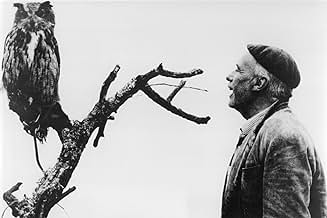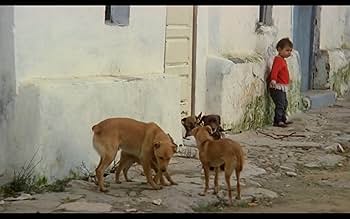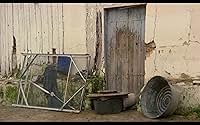VALUTAZIONE IMDb
8,1/10
5055
LA TUA VALUTAZIONE
Aggiungi una trama nella tua linguaSpain, 1960s. The family of poor farmers work hard in the countryside for the rich landowners who exploit them.Spain, 1960s. The family of poor farmers work hard in the countryside for the rich landowners who exploit them.Spain, 1960s. The family of poor farmers work hard in the countryside for the rich landowners who exploit them.
- Regia
- Sceneggiatura
- Star
- Premi
- 6 vittorie e 4 candidature totali
Pepín Salvador
- Obispo
- (as José Salvador)
Recensioni in evidenza
Back to the beginning of the 20th century, the countryside of the Iberian peninsula was controlled by land tenants who enjoyed a set of privileges that would be considered more typical of the middle ages than of modern times. As for example, having enslaved families working on their farms.
Now this is obviously an issue that 2 actual European Union countries like Spain and Portugal don't like to be reminded of. Nobody likes to remember that less than 50 years ago this was still a reality. So with time it became a non-issue, an unsponsored reality.
What Camus does with this movie is remarkable. Not only by his technique and the end result of this film, but mainly because it gives voice - and more importantly, it gives images - to this hundred of anonymous stories that were never portrayed before with such care.
A must see.
Now this is obviously an issue that 2 actual European Union countries like Spain and Portugal don't like to be reminded of. Nobody likes to remember that less than 50 years ago this was still a reality. So with time it became a non-issue, an unsponsored reality.
What Camus does with this movie is remarkable. Not only by his technique and the end result of this film, but mainly because it gives voice - and more importantly, it gives images - to this hundred of anonymous stories that were never portrayed before with such care.
A must see.
This film will shake you to the bottom. It is truly unusual to come across a movie where deep sociological, psychological and historical issues are dealt with so soberly. This movie shows quietly all the horror and brutality of rural (feudal) life in southern Spain during the hard years of the Franco dictatorship. This film, and the novel it is based on (by M. Delibes) pays humble homage to the history of millions who were silently oppressed by the class of rural landowners that supported Franco. Now, what performances by Juan Diego, Alfredo Landa and Paco Rabal. I really recommend it to anyone interested in realist art.
In the opening scenes of this movie, I couldn't tell what century it was. The peasant family living in their hovel with no electricity or running water and their subservient attitude toward the master made me wonder if this movie was taking place in the 19th century. But no, a car appeared, a model from the 1960s, so I knew that it took place in relatively recent times.
Filmed in muted, grayish tones reminiscent of a Goya painting, this film gives one an idea of what life must have been like, not only for Spanish peasants in the Franco era but also for medieval serfs and slaves in the pre-Civil War South. The master and mistress treat their own whims as more important than the peasants' needs, require them to act and speak in a subservient manner, act as if small favors are huge concessions (The family gets to move into a house with electricity!), and literally treat the men of the family as if they were hunting dogs, forcing them to fetch the game that the master spends an inordinate amount of time shooting. In one case, a man is forced to fetch while trying to recover from a broken leg. When foreign visitors criticize the master and mistress for their treatment of the peasants, they make a big show of demonstrating that the peasants are happy and can write their own names (but only because they have just been taught).
But the world is changing, and even the meekest peasant may reach his limit...
Unfortunately, this film has never been released on DVD for Region 1, and the Region 2 version is out of print, so few people will be able to see this brutal but fascinating glimpse of the twilight of an era when Spanish society was composed of countless little dictatorships.
Filmed in muted, grayish tones reminiscent of a Goya painting, this film gives one an idea of what life must have been like, not only for Spanish peasants in the Franco era but also for medieval serfs and slaves in the pre-Civil War South. The master and mistress treat their own whims as more important than the peasants' needs, require them to act and speak in a subservient manner, act as if small favors are huge concessions (The family gets to move into a house with electricity!), and literally treat the men of the family as if they were hunting dogs, forcing them to fetch the game that the master spends an inordinate amount of time shooting. In one case, a man is forced to fetch while trying to recover from a broken leg. When foreign visitors criticize the master and mistress for their treatment of the peasants, they make a big show of demonstrating that the peasants are happy and can write their own names (but only because they have just been taught).
But the world is changing, and even the meekest peasant may reach his limit...
Unfortunately, this film has never been released on DVD for Region 1, and the Region 2 version is out of print, so few people will be able to see this brutal but fascinating glimpse of the twilight of an era when Spanish society was composed of countless little dictatorships.
10erwinoz
If I would believe in a god who created man as his equal, Mario Camus would be one of the first people to come in mind to make me understand how powerful that god must be. 'Los santos inocentes' is a masterpiece of European cinema. The movie brings us back to times in Spain where most people were nothing more than property of the few rich. The 'master' even had the right to be the one to make the daughters of his serfs lose their virginity. A man and wife living such a cruel life, with trouble enough of their own, still open up their house for the wife's brother Azarias (Francisco Rabal), when he -at old age- loses his job. And Rabal gives us a performance of simplicity and joy that we will never ever forget. Although I've heard of people who found it difficult to see the beauty through all the misery, to me this is one of the most beautiful movies I've ever seen. Possibly also the very best.
The last twenty five years of Spanish filmography have produced a number of titles which have indulged in sociological themes, mostly using the years of the Franco Régime as a background when not a mere scapegoat. El Sur (Victor Erice)(qv), Las Ratas (Giménez Rico)(qv), Las Bicicletas son para el Verano (Jaime Chávarri) as well as several by the now deceased Pilar Miró, come to mind. But perhaps none reach the powerful endorsement achieved in Los Santos Inocentes, carefully and predictably directed by Mario Camus. Faithfully transferred from the book by Miguel Delibes, also author of Las Ratas, as well as singularly impressive narratives such as Cinco Horas con Mario, a true tour de force in contemporary literature, and the intensely lyrical and moving El Camino, Camus inspired the principal actors - Paco Rabal, Alfredo Landa and Terele Pávez - into producing some memorable scenes.
Scenes of illiterate peasants obeying their master, landowner, insensible to everything except his passion for hunting; peasants who were so hugely grateful for the handful of pennies so compassionately handed out by the rich duchess; peasants who grovelled in the filth of their mean shack and could barely write their own names. Spain: about 1962 if the registration number of the big black Mercedes is anything to go by. Spain, in the region called Extremadura, which even today is the poorest part of the country. Spain, governed by a dictator who himself was extremely uncultured.
Camus, armed with the simple but sincere exposition in Delibes' novel, manages to show this plight, but without the tremendism so frequent in Spanish books or films; without any soured feelings, but dispassionately, like a surgeon operating for the five hundredth time on gall-stones. The story was there to be told and not sympathized over. Not for the pop-corn eating public, more for the discerning cinema-goer who can give what the film demands: attention to details. The incision is precise, exact, giving greater credibility to this little masterpiece.
Scenes of illiterate peasants obeying their master, landowner, insensible to everything except his passion for hunting; peasants who were so hugely grateful for the handful of pennies so compassionately handed out by the rich duchess; peasants who grovelled in the filth of their mean shack and could barely write their own names. Spain: about 1962 if the registration number of the big black Mercedes is anything to go by. Spain, in the region called Extremadura, which even today is the poorest part of the country. Spain, governed by a dictator who himself was extremely uncultured.
Camus, armed with the simple but sincere exposition in Delibes' novel, manages to show this plight, but without the tremendism so frequent in Spanish books or films; without any soured feelings, but dispassionately, like a surgeon operating for the five hundredth time on gall-stones. The story was there to be told and not sympathized over. Not for the pop-corn eating public, more for the discerning cinema-goer who can give what the film demands: attention to details. The incision is precise, exact, giving greater credibility to this little masterpiece.
Lo sapevi?
- QuizVoted eighth best Spanish film by professionals and critics in 1996 Spanish cinema centenary.
- ConnessioniFeatured in ¡Qué grande es el cine!: Los santos inocentes (1996)
I più visti
Accedi per valutare e creare un elenco di titoli salvati per ottenere consigli personalizzati
- How long is The Holy Innocents?Powered by Alexa
Dettagli
- Data di uscita
- Paese di origine
- Sito ufficiale
- Lingua
- Celebre anche come
- The Holy Innocents
- Luoghi delle riprese
- Aziende produttrici
- Vedi altri crediti dell’azienda su IMDbPro
- Tempo di esecuzione1 ora 47 minuti
- Colore
- Mix di suoni
- Proporzioni
- 1.66 : 1
- 1.78 : 1
Contribuisci a questa pagina
Suggerisci una modifica o aggiungi i contenuti mancanti


![Guarda Tráiler [OV]](https://m.media-amazon.com/images/M/MV5BMDA4ZTRjZjktOTJjYi00MGRlLWE3NDktYzgzNDAyYjk4NjY5XkEyXkFqcGdeQXRyYW5zY29kZS13b3JrZmxvdw@@._V1_QL75_UX500_CR0)




























